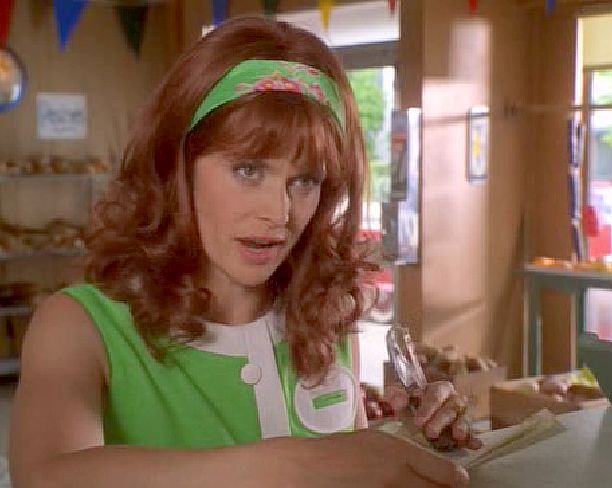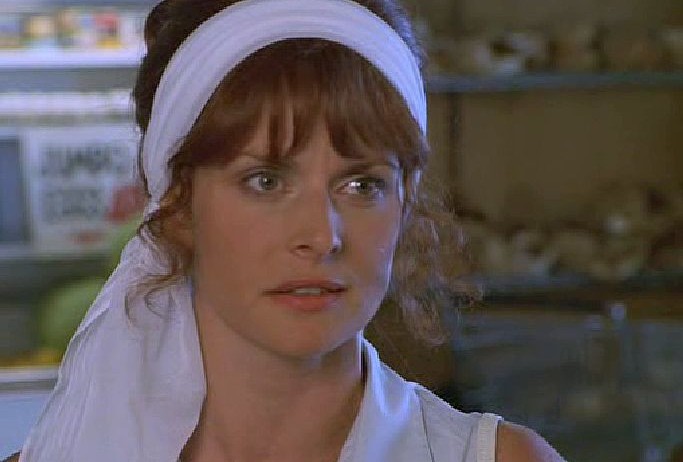Dir: Robert Wise
Star: Peter Falk, Aaron Meeks, Nastassja Kinski, Andrew McCarthy
This TV movie was the last thing to be directed by Wise before his death, and while it’s a long way short of the work for which he won multiple Oscars, running the gamut from The Haunting to The Sound of Music, it’s competent enough, helped immeasurably by a strong performance from Falk as grumpy deli owner Abel Shaddick. It’s a remake of a 1970 film; the original had Peter Ustinov in the central role, with the script for both written by Rod Serling, best known as the creator of The Twilight Zone. This is certainly nowhere near as dark or twisted; might have been kinda fun if there had been a reveal at the end, such as – oh, I don’t know – Shaddick being the Devil or something.
Instead, it’s an almost entirely predictable relationship drama. Set in 1969, the irascible Shaddick runs his deli in Fairview, a small town in upstate New York, and has almost no friends or family, his wife having died and his son having been killed late in World War II. The only person who hangs around is his ne’er-do-well nephew, Stanley (McCarthy), who stays with Abel in between get-rich-quick schemes. Seeking to impress at a party, Stanley signs up for a charity scheme which sends kids from the New York inner city out to stay for a couple of weeks vacation in places like Fairview. However, he immediately bails for Jersey City, leaving Abel to handle both the child, Herman D. Washington (Meeks), and Gloria Ross (Kinski), the local organizer of the project. Oh, and the kid is black and has baggage of his own; or, as Abel puts it, “I don’t need a three-foot tall, Ethiopian anti-Semite.”
If you’ve seen enough TV movies – and more than three is probably sufficient – you’ll be able to guess where this going. Herman is going to soften Abe’s glacial heart, and the two will come to appreciate each other, both learning to accept alternative personalities and lifestyles, overcoming the prejudices both of themselves and the local community, etc. etc. And you will be exactly spot-on with your assessment. There isn’t a single moment here which is not telegraphed way in advance, whether it’s swimming at the local country club, or Herman’s brother fighting out in Vietnam. Really, given Serling’s amazing track record of inventive work, it’s hugely disappointing, although the race relations theme is one which was a frequent aspect, particularly in The Twilight Zone.
 Fortunately, it’s salvaged by Falk, who manages to glue the lumpy and cliched aspects of the script together through his portrayal, which contrast the spiky exterior of Shaddick with the lonely old man inside. The first scene has him closing up the deli for the day, and complaining to a local cop, who is laughing hysterically at the old man; I’m not sure if this reaction was intended by Wise as a deliberate mis-step, because it’s wholly inappropriate, since Shaddick is clearly not kidding. It doesn’t make a great deal of sense at the time, and it’s only later you realize he genuinely seems to loathe his life. Of course, it takes that three-foot tall Ethiopian anti-Semite to reawaken the kinder, gentler Abe, be re-introducing him to simply joys like fishing.
Fortunately, it’s salvaged by Falk, who manages to glue the lumpy and cliched aspects of the script together through his portrayal, which contrast the spiky exterior of Shaddick with the lonely old man inside. The first scene has him closing up the deli for the day, and complaining to a local cop, who is laughing hysterically at the old man; I’m not sure if this reaction was intended by Wise as a deliberate mis-step, because it’s wholly inappropriate, since Shaddick is clearly not kidding. It doesn’t make a great deal of sense at the time, and it’s only later you realize he genuinely seems to loathe his life. Of course, it takes that three-foot tall Ethiopian anti-Semite to reawaken the kinder, gentler Abe, be re-introducing him to simply joys like fishing.
For Kinski, this is a little bit of a reunion, bringing her back on screen with Falk, whom she acted alongside in Faraway, So Close. Also present, though the two don’t share any scenes, is Ruby Dee, who was Malcolm McDowell’s house-keeper in Cat People, and here plays Washington’s grandmother and guardian. The highlight, dramatically, is probably a scene where Gloria returns to the deli, and gets into a verbal fire-fight with Abe, each mounting a stoic and intransigent defense of their respective positions. The grumpy old man spits out lines such as “An act of kindness is not such a big deal when it comes in fashionable spasms during the social season,” the charitable young woman volleying back equally as hard. But it’s one of the rare cases Nastassja is in a film where she has absolutely no love interest at all. I was half-expecting her and McCarthy to get together at some point, but after Stanley has kicked off the plot, he all but vanishes from the movie.
Technically, it’s likely better than normal, and Wise takes care of proceedings with a necessarily lighter hand, turning the soft soap of the script into acceptable drama. On the other hand Cynthia Millar’s score, produced by another man with whom the Academy Awards are familiar, Elmer Bernstein, seems about as unsubtle as the story, full of violins swelling heavily to indicate when we should have the feels. I guess that kind of thing goes with the territory, I suppose, when you have a co-production between Showtime and Hallmark Entertainment. I suspect retaining the era of the original might have been a mis-step, since it robs the story of whatever contemporary power it might have at the time; it would have been quite easy to update it, say making Abe’s son killed in Vietnam and Washington’s brother fighting somewhere else. Most of the other aspects would have needed little tweaking at all – though these days, a man in his seventies taking a little kid to the movies could provoke calls to the cops!
As these things go though, it’s by no means bad. Falk is a pleasure to watch, even when he’s doing nothing more dramatic than chatting to the photo of his dead son. If there are few if any surprises to be had here, providing you aren’t expecting them, that doesn’t necessarily make for a unenjoyable time.
